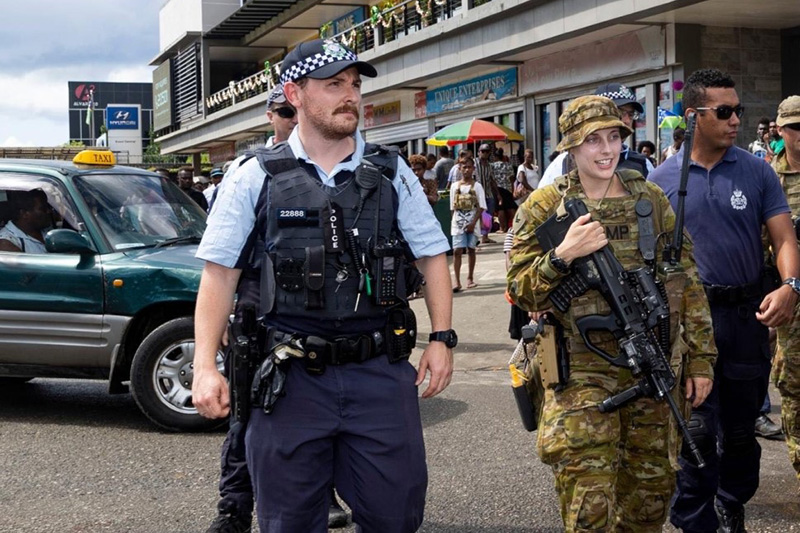Last month, it appeared that Vanuatu’s then Prime Minister, Ishmael Kalsakau, had survived a parliamentary no-confidence vote. It turned out to be simply a stay of execution.
It’s likely that policing with ‘Chinese characteristics’ – using police to defend a political regime – will prove difficult for the people of Vanuatu to stomach. It does not align with the Pacific way of doing things. Neither does it align with decades of reform.
Two weeks ago, the Pacific island nation’s Parliament elected Sato Kilman as Prime Minister. It’s not clear yet whether this challenge was related to domestic issues, or whether it was another round in the competition for influence in the Pacific. Kalsakau had been heavily criticised for signing a security pact with Australia.
An immediate concern for Canberra is that during the political crisis, Beijing sent police personnel and equipment to train and build the capacity of Vanuatu’s police force. China’s ambassador, Li Minggang, stated that the Chinese police would “greatly enhance the ability of Vanuatu police to maintain social order”.
But it’s likely that policing with ‘Chinese characteristics’ – using police to defend a political regime – will prove difficult for the people of Vanuatu to stomach.
It does not align with the Pacific way of doing things. Neither does it align with decades of reform. It’s a setback for the quality of policing in Vanuatu. For Australia, with its long history of providing police capacity development, this represents a lost opportunity.
Unjust practices
Policing in the Pacific is challenging. Large geographical areas, heterogeneous societies, violent crime, corruption and political instability can present logistic and policy issues.
In many cases, police fill a hybrid role that merges law enforcement with national security, especially in nations like Vanuatu that lack a military or similar institutions. Police occupy a significant role with few counterbalances. Operational practices and organisational culture are therefore fundamental to producing just outcomes.
For Beijing, the solution to policing problems in Vanuatu and elsewhere in the region is relatively straightforward: increase the police force’s capacity to keep order and focus on protecting the state and its leaders.
Law enforcement in Pacific island countries has undergone substantial reform with a greater focus on democratic policing, prioritising protecting people rather than controlling them. Australian and New Zealand police have been on the front line of this reform.
It’s a solution derived from China’s own experience and doctrines, superimposed this time on the Pacific island context. Such thinking is wrong-minded and doesn’t align with the historical development of the region’s police organisations.
Most of the Pacific’s police forces were established under colonial rule and were used by nations like the UK, France and Australia to control local populations. Police operations focused on dominating communities and being accountable to the regime, not the people.
Sharp similarities can be drawn between these historical police organisations and those currently operating in China. Beijing’s approach could lead to a slide back towards unjust practices.
In the years since independence, police in some Pacific nations were involved in conflict and the suppression of democracy, which created deep multigenerational distrust between the people and the police. That legacy has been hard to shift.
Over recent decades, policing across the region has advanced significantly. Remnants of the old ways remain, but law enforcement in Pacific island countries has undergone substantial reform with a greater focus on democratic policing, prioritising protecting people rather than controlling them. Australian and New Zealand police have been on the front line of this reform.
Multigenerational connections
Australia’s law enforcement community has deep and lasting multigenerational connections to policing in the Pacific, not just as donors but as partners. While we provide equipment, the relationship concerns more than a state’s security.
The world-leading organisation once used by the Government for such missions, the Australian Federal Police’s International Deployment Group (IDG), no longer exists.
With such deep connections and alignment of purpose, why didn’t Australia offer to assist in Vanuatu? The answer is a lack of capacity. Already, federal, state and territory police services are heavily committed and the amount of reported crime far exceeds their capacity to respond. The world-leading organisation once used by the Government for such missions, the Australian Federal Police’s International Deployment Group (IDG), no longer exists.
In 2004, the Government created the group specifically for missions overseas. As the first of its kind in the world, the IDG was tasked with helping to build policing capacity and respond to emergencies.
In March 2007, the IDG employed more than 600 people with approximately 250 Australia-based and 350 deployed overseas. Of the 350 on those operations, 100 officers were seconded from Australian state police and 13 came from Pacific island countries. The rest were AFP personnel.
The 250 Australia-based personnel were primarily unsworn officers working in areas such as human resources, finance, contracts and logistics, capacity building and training.
Over the past decade, the IDG was reduced and then merged into the AFP’s international operations capability. This was largely in response to declining demand for peacekeeping contributions and was seen as a cost-saving measure.
With increased geopolitical competition in the region, Beijing is offering alternative policing capacity development to that provided by Australia and New Zealand. In addition to providing equipment to Vanuatu, China has provided equipment, policing advice and training to Solomon Islands.
Democratic values
Beijing offers a flawed policing model that Australia must contest. To help the region avoid the securitisation or militarisation of police forces, a reinvigorated capacity is required.
Australia needs a new IDG to respond to regional law enforcement issues and provide capacity development to support democratic policing. It needs to include officers from across the Pacific, Australia and New Zealand.
When not responding to regional crises, it could focus on ensuring that the region’s police reform continues towards democratic values and not authoritarian ones.
This article first appeared on the ASPI Strategist, and is republished under a Creative Commons Licence; you can read the original here
Picture © Australian Federal Police


